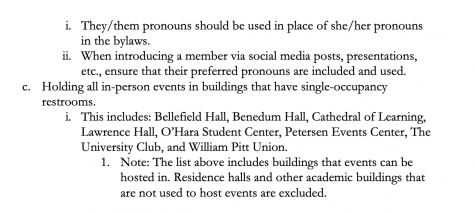Sorority changes bylaws to welcome non-binary, transgender students
Image courtesy of Celeste Lintz
Members of Phi Sigma Rho at the annual Light the Night hosted by the Leukemia & Lymphoma Society outside of Heinz Field on Oct. 14.
December 1, 2021
For members of Pitt’s chapter of Phi Sigma Rho, a social engineering and STEM sorority, excluding non-binary and trangender people from Greek organizations is unacceptable. The sorority recently updated its bylaws to be more welcoming through inclusive language and pronoun use as well as anti-discrimination clauses.
Maddi Viteri, the chapter’s former vice president of diversity, equity and inclusion, said the sorority’s previous bylaws lacked specificities about inclusion, and the sorority’s recruitment climate was a sort of “don’t ask, don’t tell” policy. The chapter officially changed its bylaws this semester after initially crafting them in fall 2020.
Viteri, and other leaders in some academic and social sororities at Pitt, are looking to change protocols that they say likely excluded non-binary and transgender students.
Viteri, a junior bioengineering major who also was Phi Sigma Rho’s first vice president of DEI in fall 2020, said the sorority’s previous policy needed to be corrected.
“So if you would want to go through recruitment and you were non-binary, you were basically told like, ‘Oh, you’re non-binary, don’t tell us again until after you get in and that is fine,’ which I think is very weird and wrong,” Viteri said.
Viteri sought to change her chapter’s bylaws to be more inclusive of non-binary individuals after an increase in Black Lives Matter protests during summer 2020.
“In light of all the BLM protests we created the position for diversity and inclusion, and so I took a look at the bylaws and realized that there wasn’t a whole lot there for minorities in general,” Viteri said. “And so I worked with the committee and we made a lot of changes that protect people of color and non-binary individuals and transgender people.”
Viteri said she thought it was important to amend the bylaws to make sure that non-binary individuals and minority groups are aware that they are included within the organization. Viteri said she considered changes made to the bylaws to be an addition, since bylaws concerning anti-discrimination were previously “nonexistent.” The chapter also made a separate update to its bylaws in fall 2020 to define verbal, physical and electronic altercations as harassment. The sorority voted to approve the new bylaws that semester, and brought up these changes at a national level over the summer.
“We voted to include those bylaw changes in our organization’s constitution so that going forward, it would be more clear to people who were in those categories that they were protected and they were welcomed in our organization,” Viteri said.
Phi Sigma Rho passed the addition of the following bylaws with a unanimous vote.


Viteri also said she brought the bylaw changes to the attention of the national organization along with Celeste Lintz, the chapter’s current vice president of diversity, equity and inclusion.
“After all these changes happened internally within our chapter, this past summer we had our national convention, and during that convention they made a national change to include non-binary members to be included in recruitment for all Phi Sigma Rho chapters across the U.S.,” Viteri said.
Other VP’s of DEI’s in Greek life have also moved to take a more active role in promoting inclusivity. Mati Castillo — the diversity, equity and inclusion chair for Kappa Kappa Gamma, a social sorority — said she is “all for” a more active approach to enforcing non-discrimination policies.
“You know a lot of us have these non-discrimination statements either by chapter or by national bylaws where we say we don’t discriminate based on like gender identity, but I feel like a lot of times people only say it and don’t really mean it,” Castillo said.
Castillo said this type of progress will help increase the longevity of Greek life in the future.
“I think changing the bylaws is exactly what we need to do, especially if we want to keep Greek life going, because there are plenty of people assigned female at birth or assigned male at birth who do identify as non-binary but still want to participate in these organizations,” Castillo said.
Castillo, a junior anthropology and Spanish double major, said she definitely wants to try to change her chapter’s bylaws to be more inclusive, especially after seeing other organizations take steps to improve.
“This is something that I will definitely be bringing up at our chapter council meeting for my sorority,” Castillo said. “We want to get the ball rolling for just our individual chapter right now because there’s only so much we can do, since we are beholden to these bigger organizations, but we know that for us, we’re going to start by at least adapting the language that we use to reflect what we say and care about.”
Castillo said she does anticipate some opposition to potential bylaw changes, due to some people wanting to maintain what she described as Greek life traditions.
“I mean, I do think there will be opposition just because, you know, sororities and fraternities were founded as a club specifically for men and this is a club specifically for women,” Castillo said. “I think sometimes it is genuine, like, maliciousness and ignorance that can get in the way of inclusivity.”
Some cultural Greek organizations already took steps to avoid exclusive language. Ylan Nguyen — the diversity, equity and inclusion chair of Alpha Sigma Rho, an Asian-interest sorority — said she modified the bylaws in her chapter after the chapter’s experience at a risk management retreat.
“We try to avoid using any specific pronouns like he/her, so in case anybody is non-binary they feel included within our chapter,” Nguyen, a senior neuroscience major, said. “We changed the terminology because we went to a risk management retreat where they pointed out the discrimination in our language that we didn’t even know existed in our bylaws.”
Viteri said Phi Sigma Rho hopes the changes to the group’s bylaws can set a precedent for other organizations, so all of Greek life can be more inclusive.
“We haven’t done much yet to bring our ideas to others, but I think it’s a very valuable idea to move across the rest of Greek life, just because I definitely think other organizations would benefit from what we did,” Viteri said.



